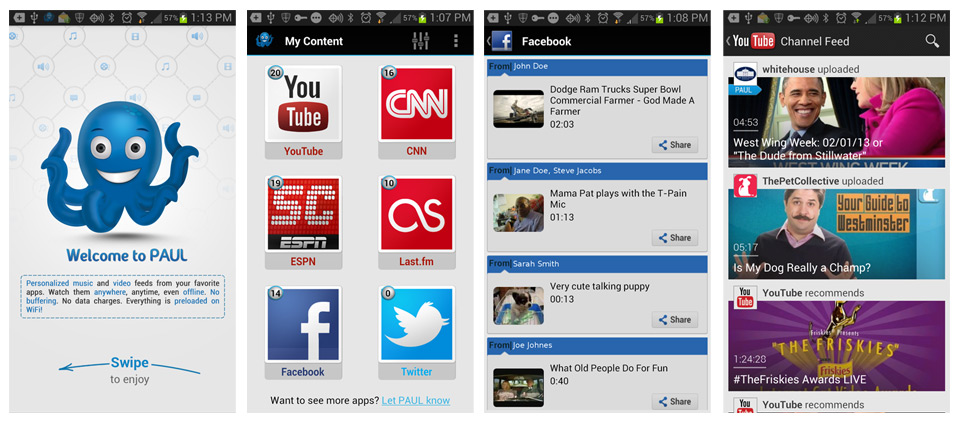With tablets and smartphones consuming more and more video content, a new app for Android simply called “PAUL” aims to ease that ever-increasing network strain by using a predictive cache/download algorithm.
Similar to peak-shaving in electrical grids, PAUL is an app that, based on the videos you watch, begins to predict your video consumption preferences, initially from five different major video sharing services — Facebook, YouTube, Twitter, CNN and ESPN ScoreCenter. PAUL also integrates with Last.fm, providing preloaded playlists from users’ favorite stations.
The app then downloads and caches select videos that match your preferences whenever the app is connected to local WiFi networks, thus making the videos available without a need for data connectivity.
It’s a simple idea and a good one at that. It seems like it really could ease network strain.
First of all, I love that there is an app named PAUL. But why not John or George or Ringo or Dave, or Steve or Larry? Actually, it’s named after the octopus who correctly predicted the outcome of Germany’s 7 matches in the 2010 FIFA World Cup — a nod to the app’s gift for preference prediction.
Citing Cisco statistics that by 2017, two-thirds of world mobile data will be video content, the Columbus Ohio based app maker inmobly could be in a good position to offer real value to data providers and MVNOs alike.
And the electrical grid “peak-shaving” concept is not surprising, considering that inmobly was founded in 2011 by Hesham El Gamal, professor of electrical engineering at The Ohio State University, and also by Nayer Wanas. There are obviously some other believers out there too considering that the company has received $650,000 in pre-seed funding, led by TechColumbus among others.
With a two prong strategy of stand-alone app (for proof of concept) but also an integration approach to major video providing services themselves, the concept looks attractive.
But in this writer’s opinion, what is even more attractive than the sheer data-network-saving innards, is the boatload of preference data that could be collected. That could be extremely attractive to content providers and therein lies the real power of this capable concept.
These guys could be sitting on a gold mine.
The only concern I have is how this background-running app could affect device battery life. I reached out to inmobly’s Liza Reed with this question and she responded that:
“PAUL does not run all the time. PAUL ‘wakes up’ periodically to download content over WiFi. There is actually a battery check in PAUL — if the battery is low PAUL won’t download content so as not to drain the phone. In our testing we have not seen battery issues caused by PAUL itself, either experientially or by checking the android battery manager.”
So I guess that’s good news.
The app is available in the Google Play store starting today.

